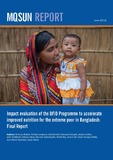| dc.contributor.author | Nisbett, Nicholas | |
| dc.contributor.author | Longhurst, Richard | |
| dc.contributor.author | Barnett, Inka | |
| dc.contributor.author | Feruglio, Francesca | |
| dc.contributor.author | Gordon, Jessica | |
| dc.contributor.author | Hoddinott, John | |
| dc.contributor.author | Jahan, Ferdous | |
| dc.contributor.author | Karachiwalla, Naureen | |
| dc.contributor.author | Roy, Shalini | |
| dc.contributor.author | Shah, Valsa | |
| dc.contributor.author | Siddiki, Omar Faruque | |
| dc.contributor.author | Tranchant, Jean-Pierre | |
| dc.contributor.author | White, Jessie | |
| dc.coverage.spatial | Bangladesh | en |
| dc.date.accessioned | 2017-02-01T16:42:30Z | |
| dc.date.available | 2017-02-01T16:42:30Z | |
| dc.date.issued | 2016-06 | |
| dc.identifier.citation | Nisbett, N., Longhurst, R., Barnett, I., Feruglio, F., Gordon, J., Hoddinott, J., Jahan, F., Karachiwalla, N., Roy, S., Shah, V., Siddiki, O.F., Tranchant, J-P. and White, J. (2016) Impact evaluation of the DFID Programme to accelerate improved nutrition for the extreme poor in Bangladesh: Final Report, MQSUN Report, Brighton: MQSUN, | en |
| dc.identifier.uri | https://opendocs.ids.ac.uk/opendocs/handle/20.500.12413/12803 | |
| dc.description.abstract | The DFID Programme to Accelerate Improved Nutrition for the Extreme Poor in Bangladesh (2013 – 2016) aimed to improve nutrition outcomes for children, pregnant women, mothers and adolescent girls by incorporating a set of nutrition-specific interventions as part of three existing livelihood support programmes in Bangladesh targeting the extreme poor. These three programmes were the Chars Livelihoods Programme (CLP), the Economic Empowerment of the Poorest (EEP) Programme and the Urban Partnership for Poverty Reduction (UPPR) Programme.
In order to rigorously and independently assess the impacts of the integration of the nutrition and livelihoods interventions, in 2013 DFID commissioned a mixed-method impact evaluation, entitled ‘Impact Evaluation of the DFID Programme to Accelerate Improved Nutrition for the Extreme Poor in Bangladesh’. The evaluation team consisted of the Institute of Development Studies (IDS, the lead organisation), the International Food Policy Research Institute (IFPRI), ITAD, the Center for Natural Resource Studies (CNRS), and the BRAC Institute of Governance and Development (BIGD). The project was carried out under the umbrella of the MQSUN framework consortium led by PATH in Washington, DC. The evaluation employed mixed quantitative and qualitative methods within a strong theory-based design. The evaluation was completed in June 2016.
This Final Report presents the evaluation’s main findings and conclusions, integrating results from across the evaluation’s quantitative and qualitative components and providing some key recommendations considered relevant for future programming. The Report also provides an overview of the programmatic background and evaluation’s final design and methods. | en |
| dc.language.iso | en | en |
| dc.publisher | Maximising the Quality of Scaling up Nutrition (MQSUN) | en |
| dc.relation.ispartofseries | MQSUN Report; | |
| dc.rights.uri | http://www.ids.ac.uk/files/dmfile/IDSOpenDocsStandardTermsOfUse.pdf | en |
| dc.subject | Health | en |
| dc.subject | Nutrition | en |
| dc.title | Impact evaluation of the DFID Programme to accelerate improved nutrition for the extreme poor in Bangladesh: Final Report | en |
| dc.title.alternative | Accelerate-Improved-Nutrition-Extreme-Poor-Bangladesh | en |
| dc.type | Other | en |
| dc.rights.holder | DFID | en |
| dc.identifier.externaluri | https://www.gov.uk/government/uploads/system/uploads/attachment_data/file/566031/Accelerate-Improved-Nutrition-Extreme-Poor-Bangladesh.pdf | en |
| dc.identifier.team | Health and Nutrition | en |
| rioxxterms.funder | Department for International Development, UK Government | en |
| rioxxterms.identifier.project | Maximising the Quality of Scaling Up Nutrition Programmes Framework (MQSUN) | en |
| rioxxterms.version | NA | en |
| rioxxterms.funder.project | 306f4a20-2ef1-40c2-bcb4-654b3745d8bb | en |

